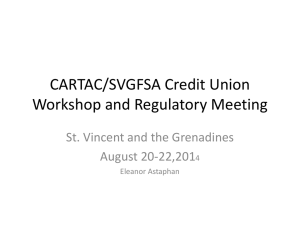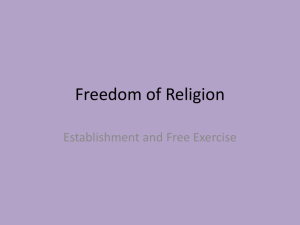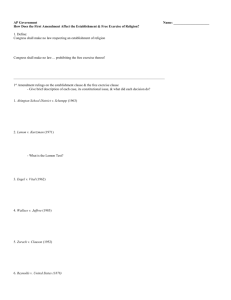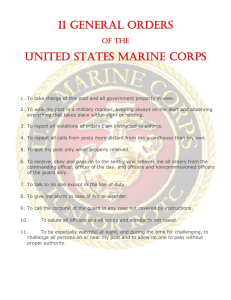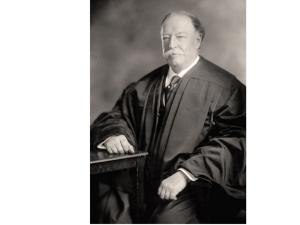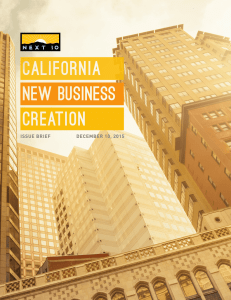Bigelow v. Virginia (197??)
advertisement
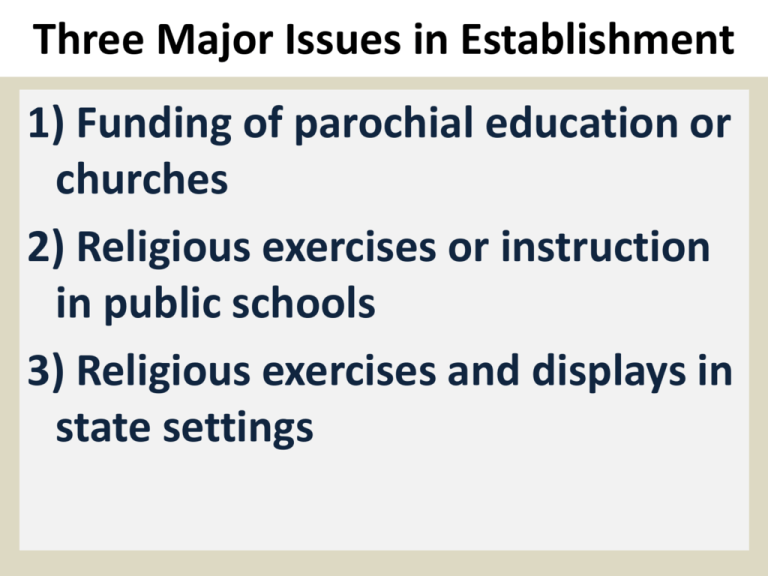
Three Major Issues in Establishment 1) Funding of parochial education or churches 2) Religious exercises or instruction in public schools 3) Religious exercises and displays in state settings Two Historical Interpretations: Accommodationist Establishment clause only binds Congress to allow state policies Based on: Larger theory of Bill of Rights Language: “Congress shall not” Continuing history of establishment Religious Establishment Eight States - CT, GA, MA, MD, NH, NJ, NC, SC allowed establishments in 1789. BUT: only four states had establishments in 1791 when Bill of Rights was ratified: GA, NJ, NC, SC. Five States - NH, MA, CT, MD, and SC required Protestantism for officers of the state Religious Establishment PA, DE, NC, SC required state officers to believe Bible was to be divine inspired. PA and SC required officers to believe in heaven and hell and one eternal God DE and MD required state officers to profess Christianity Delaware required state officers to profess the doctrine of the Trinity Two Historical Interpretations: Separatist First Amendment captures movement of time to reverse establishment Based on: Virginia Statute on Religious Liberty Jefferson Letter to Danbury Baptists Madison’s own politics and belief Separationism in Art VI of the Constitution The Senators and Representatives before mentioned, and the Members of the several State Legislatures, and all executive and judicial Officers, both of the United States and of the several States, shall be bound by Oath or Affirmation, to support this Constitution; but no religious Test shall ever be required as a Qualification to any Office or public Trust under the United States Religious Separation VA and RI had full freedom of exercise of religion and no establishment of religion. PA and RI never had an establishment. New York required that citizens "Abjure foreign allegiance and subjection in all matters ecclesiastical as well as civil." Religious Separation Three states: NY, DE, and SC excluded ministers from all civil office. Four states: GA, MD, NC, and VA excluded ministers from the legislature. South Carolina expressed its belief in religious "toleration." Religious Founders? Orthodox Christians Alexander Hamilton, John Jay, John Adams (up to and during Presidency) Deists/Unitarians/Agnostics Benjamin Franklin, George Washington, John Adams (after Presidency), Thomas Jefferson, James Madison, James Monroe, John Quincy Adams, John Marshall Treaty of Tripoli (1797), Article 11 As the government of the United States of America is not in any sense founded on the Christian Religion, as it has in itself no character of enmity against the laws, religion or tranquility of Musselmen, and as the said States never have entered into any war or act of hostility against any Mehomitan nation Board of Education v. Allen (1968) New York's Education Law required local public school authorities to lend textbooks free to all students in grades 7 to 12, including those in private schools. Textbooks were in secular subjects, same chosen for use in public schools. No evidence that secular textbooks were used to teach religion Lemon Test 1) Must have secular legislative purpose 2) Primary effect must neither advance nor inhibit religion 3) Must not foster excessive governmental entanglement with religion. Zobrest v. Catalina Foothills S.D. (1993) Zobrest's parents sent their deaf son to a Roman Catholic high school and requested the local school board provide their son with a sign-language interpreter. Court held (5-4) that interpreters are different from teachers and that thus a public employee was not endorsing religion as an interpreter.
